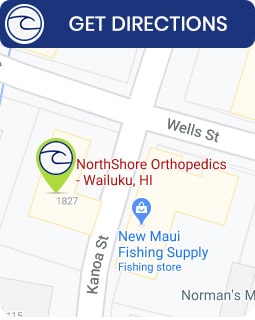What Are Common Orthopedic Conditions?
Orthopedic problems encompass a range of injuries and diseases that affect the musculoskeletal system, which includes the muscles, bones, nerves, joints, ligaments, tendons, and other connective tissues. Board-Certified Dr. Charles Soma, MD, at NorthShore Orthopedics provides comprehensive and specialized care. For more information, contact us today or schedule an appointment online! We are conveniently located at 1827 Wells St #1, Wailuku, HI 96793.


Table of Contents:
What are considered orthopedic problems?
How do you diagnose orthopedic conditions?
What are the causes of orthopedic conditions?
When to visit an orthopedic specialist?
Orthopedic problems encompass a range of injuries and diseases that affect the musculoskeletal system, which includes the muscles, bones, nerves, joints, ligaments, tendons, and other connective tissues. These conditions can arise from either chronic orthopedic diseases or acute injuries.
While some orthopedic issues may be resolved on their own or with rest, particularly in the case of mild injuries, others may necessitate treatment from an orthopedic doctor. Orthopedic physicians specialize in preventing, diagnosing, and treating disorders and injuries related to the musculoskeletal system. Common orthopedic problems include conditions such as arthritis, osteoporosis, tendonitis, herniated discs, sprains, strains, and fractures.
Diagnosing orthopedic conditions involves a range of tests that aid in determining the presence and severity of the condition, as well as excluding other potential causes of symptoms.
Various diagnostic tests are commonly employed in orthopedics. These tests utilize established technologies such as X-ray, MRI, ultrasound, and computed tomography to provide valuable information. Examples of these tests include bone densitometry, which measures bone density, skeletal scintigraphy, which assesses bone metabolism, discography, which evaluates spinal discs, myelography, which examines the spinal cord, and electromyography, which measures muscle activity.
Additionally, flexibility tests, stress tests, muscle tests, and gait analysis assess the range of motion, identify abnormalities in skeletal alignment, and evaluate muscle function. These tests help in understanding the functional aspects of the musculoskeletal system and identifying any deviations from normal patterns.
In specific cases, additional tests such as muscle biopsy or bone marrow biopsy may be necessary to refine the diagnosis. These tests provide additional insights into the cellular and molecular aspects of the condition, aiding in a more precise diagnosis.
By utilizing a combination of these diagnostic tests, orthopedic specialists can gather comprehensive information about the condition, its location, severity, and underlying causes.
Orthopedic conditions can arise from various factors and causes, leading to problems in the musculoskeletal system. One common cause is trauma or injury, which includes accidents, falls, sports-related incidents, or other sudden physical impacts. These events can result in fractures, dislocations, sprains, and strains, causing orthopedic issues that require medical attention. Another cause of orthopedic conditions is overuse or repetitive strain.
Engaging in repetitive activities or movements, such as certain occupational tasks or sports, can lead to wear and tear on the muscles, tendons, and joints. Genetics and inherited factors play a role in certain orthopedic conditions.
Some individuals may have a predisposition to conditions like scoliosis, a condition characterized by abnormal spinal curvature, or osteogenesis imperfecta, a genetic disorder causing brittle bones. Degenerative conditions are also significant contributors to orthopedic problems.
These conditions typically occur over time due to natural aging or wear and tear on the musculoskeletal system. Infections and diseases can also lead to orthopedic problems. Infections in the bones, joints, or surrounding tissues, such as osteomyelitis or septic arthritis, can cause significant damage and functional impairments.
If you are encountering pain in your muscles, joints, or bones or facing issues with your joints, you may be contemplating whether it is necessary to seek medical attention.
If you find yourself struggling with pain, stiffness, or discomfort that significantly hinders your ability to carry out daily activities, it is recommended to seek medical guidance.
Chronic pain, that persists for more than 12 weeks, should also prompt a visit to an orthopedic specialist to identify the underlying cause and explore appropriate treatment options.
A noticeable decline in your range of motion, where you experience difficulty moving certain body parts or joints, warrants a consultation with an orthopedic specialist. Similarly, if you feel unstable while walking or standing, it is advisable to have a professional evaluation to assess the underlying issue and prevent further complications.
If you have sustained a soft tissue injury, such as a sprain or strain, and it fails to show signs of improvement after 48 hours, it is crucial to seek medical attention. An orthopedic specialist can assess the severity of the injury, provide a proper diagnosis, and recommend an effective treatment plan for optimal healing.
Treatment for orthopedic conditions is available at North Shore Orthopedics. We serve patients from Maui, Wailuku HI, Lahaina HI, Kahului HI, Kihei HI, Wailuku HI, Kula HI, Makawao HI, Paia HI, Wailea HI, Haiku HI, and Waihee-Waiehu HI.

Additional Services You May Like
▸Fractures & Sprains
▸Knee & Shoulder Injury
▸Platelet Rich Plasma PRP
▸Hand Injury and Surgery
▸Sports Medicine
▸Arthritis Treatment
▸Athletic Injury Recovery
▸Direct Orthopedic Care for Fractures
▸Male Hormonal Evaluations
▸Strains and Sprains
▸Urgent Care
▸X-Ray
▸Worker Comp
▸Back and Neck Pain
▸Wound Management
▸Semaglutide
▸Regenerative Cell Therapy
▸Microneedling With Prp
▸Stem Cell Therapy
▸Knee Surgeon
▸Shoulder Orthopedic Surgeon

Additional Services You May Like
▸Fractures & Sprains
▸Knee & Shoulder Injury
▸Platelet Rich Plasma PRP
▸Hand Injury and Surgery
▸Sports Medicine
▸Arthritis Treatment
▸Athletic Injury Recovery
▸Direct Orthopedic Care for Fractures
▸Male Hormonal Evaluations
▸Strains and Sprains
▸Urgent Care
▸X-Ray
▸Worker Comp
▸Back and Neck Pain
▸Wound Management
▸Semaglutide
▸Regenerative Cell Therapy
▸Microneedling With Prp
▸Stem Cell Therapy
▸Knee Surgeon
▸Shoulder Orthopedic Surgeon





